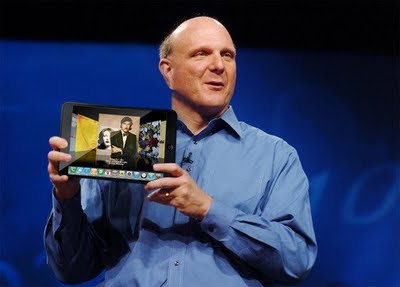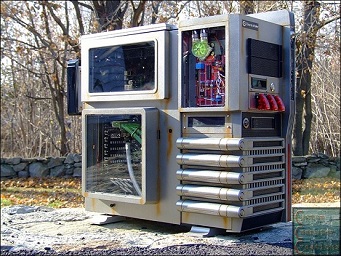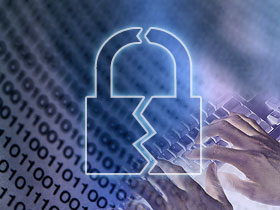Editorials
 Is Microsoft Changing its mind about Windows on ARM? That is the question that many people would like to know now. After hearing that Microsoft was committed to Windows 8 on the ARM platform due to consumer desire for a Windows based tablet (and after they have pretty much designed a tablet OS) many were under the impression that Microsoft would follow suit with other desktop products for the new mobile platform. However, after some new information was conveyed by a Microsoft Executive this might not be the case.
Is Microsoft Changing its mind about Windows on ARM? That is the question that many people would like to know now. After hearing that Microsoft was committed to Windows 8 on the ARM platform due to consumer desire for a Windows based tablet (and after they have pretty much designed a tablet OS) many were under the impression that Microsoft would follow suit with other desktop products for the new mobile platform. However, after some new information was conveyed by a Microsoft Executive this might not be the case.
- Details
- By Sean Kalinich
- Hits: 2554
Read more: Is Microsoft Changing its Mind about Windows 8...
 Editor's Note: This article was written by one of our own forum members PM_DMNKLR and was voted on by the community as the best written of the entries for November 2011. The article is reproduced here in the same format as it was originally published in our Readers' Blog Forum. Each month we will host a contest for our Forum members to write an article or a review with the chance of being published on our site (as well as win some cool stuff). So now DecryptedTech is happy to bring you November's Winning article;
Editor's Note: This article was written by one of our own forum members PM_DMNKLR and was voted on by the community as the best written of the entries for November 2011. The article is reproduced here in the same format as it was originally published in our Readers' Blog Forum. Each month we will host a contest for our Forum members to write an article or a review with the chance of being published on our site (as well as win some cool stuff). So now DecryptedTech is happy to bring you November's Winning article;
Computer modding, a discovery of one of the world's greatest subcultures, part 1: "Cultural Diversity"
The PC modding scene is quite a vast one in present day. At it's humble beginnings, quite a few moons ago, it was merely the idea of painting a case to a more peculiar color, installing a light inside of the case somewhere, adding stickers or other similar-style decals, etc., but rarely was anything so much more. Today, however, we have an industry that thrives on not only customizing our own computer periphery, but also custom creation of many components and accessories as well. Present-day computer modifications range anywhere from your basic, average LED case fan add-on, to full-blown scratch-built cases, made out of wood, plastic, steel, aluminum, fiberglass, resin, you name it and someone's making it. Even cooling has gone to the extremes in today's society, where in times of yesteryear, whilst it maintained a basis of adding an additional cooling fan or two to a much-needed area in the case or on a specific component, ie: adding an additional 1 or 2 fans to the CPU's heatsink for example, today's pc's, or "rigs" as we commonly refer to them now, have upwards of extreme liquid or even a TEC (Thermo-Electric-Cooler), also called a Peltier cooler, which transfers electricity throughout it's internal contacts, to create one side as extremely hot, by means of temperature transfer, enabling the surface of which makes contact with the CPU to remain extremely cold, thus also enabling the user to not only have a very, very low CPU temperature, but also enabling them to commit to serious overclocks, while still maintaining such deeply low temperatures.
- Details
- Hits: 3719
 It looks like Samsung might be getting some vindication on the Ban imposed on the Galaxy Tab 10.1 in Australia. It appears that at least one Appeals Judge feels that the original ban might not have been fair. According to several articles on the Internet Federal Court Justice Lindsay Foster could be the saving grace for Samsung in their legal battles down under. The original ban was put in place as a temporary measure until a full trial could take place over what Apple calls “blatant copying”. Samsung, on the other hand, feels that the ban was unjust due to the large number of other tablets on the market with the same look and feel as the iPad. To prove their point they have produced video evidence showing off tablets from Motorola, Asus, Acer and others. They feel that Apple is singling them out (in much the same way that Adobe was attacked by Apple over Flash).
It looks like Samsung might be getting some vindication on the Ban imposed on the Galaxy Tab 10.1 in Australia. It appears that at least one Appeals Judge feels that the original ban might not have been fair. According to several articles on the Internet Federal Court Justice Lindsay Foster could be the saving grace for Samsung in their legal battles down under. The original ban was put in place as a temporary measure until a full trial could take place over what Apple calls “blatant copying”. Samsung, on the other hand, feels that the ban was unjust due to the large number of other tablets on the market with the same look and feel as the iPad. To prove their point they have produced video evidence showing off tablets from Motorola, Asus, Acer and others. They feel that Apple is singling them out (in much the same way that Adobe was attacked by Apple over Flash).
- Details
- By Sean Kalinich
- Hits: 2778
 Recent events in Washington have caused quite a stir on the internet as a very oppressive bill is working its way through the legislative branch of the US government. We have talked about this bill and its dangerous consequences more than once but with the release of some new information and after a few questions that we were recently asked we are going to approach it again. First let’s give you a little background as we show you how the US will be if the SOPA (Stop Online Piracy Act) is passed.
Recent events in Washington have caused quite a stir on the internet as a very oppressive bill is working its way through the legislative branch of the US government. We have talked about this bill and its dangerous consequences more than once but with the release of some new information and after a few questions that we were recently asked we are going to approach it again. First let’s give you a little background as we show you how the US will be if the SOPA (Stop Online Piracy Act) is passed.
- Details
- By Sean Kalinich
- Hits: 3081
 In the legal world there are always interesting things going on. This is even more true when you talk about the massive number of law suits that are brought against technology companies on a daily basis. Now, it is not the actual cases that are the truly interesting thing (although some of them are). No it is the rulings and how they shape the laws that are sometimes the most fun.
In the legal world there are always interesting things going on. This is even more true when you talk about the massive number of law suits that are brought against technology companies on a daily basis. Now, it is not the actual cases that are the truly interesting thing (although some of them are). No it is the rulings and how they shape the laws that are sometimes the most fun.
For example in a recent (and ridiculous) law suit brought against Apple by a woman who wanted $5,000 for every person that had their iPhone bricked by the IO4 update the judge set something of a legal precedent. The woman (named Bianca Wofford) lost the suit, but she lost is because the judge ruled that Software was not a service or a good (as well as the fact that a free upgrade cannot be held to sale or lease laws). This point is very interesting and will play heavily in future litigation.
If software is not a service or a good what exactly is it? If on the one hand it is excluded from sale or lease laws then there is no possibility of theft as there is no monetary value to it and possess no real-world value. This little precedent might be interesting to watch in future copyright and IP based litigation. Now someone can argue that as software is not a good or service and it cannot be sold or leased (as anything that can, must be held to sale and lease laws) then there is no crime committed in the free and open use of any software available.
Of course I would not run out and start downloading all of the software out there as this legal loophole will quickly be sown up by the companies that are dependent on software-as-a-service revenue. It does illustrate something that is wrong with the legal system and technology in general though and ties in with the SOPA movement in a way that many might miss. What we have is a lack up a clear definition of the items that are in dispute. What IS software, what constitutes theft of un-real property? The laws on this are so vague that you could (under the current system) be guilty of IP theft for having a copyrighted work on display in a picture of you taken by someone else, or for a YouTube video that has music playing in the background on the radio.
Until the laws are defined (and right now it is in the interest of the media and software companies to have it vague) or the judges and lawmakers are educated in the way technology works the legal system will continue to be abused by corporations while the consumers are left holding the bag. At least in this case a definition will need to be put in place as the current one is not beneficial to any company trying to sell their software.
Discuss in our Forum
- Details
- By Sean Kalinich
- Hits: 3892
More Articles …
Page 78 of 89



